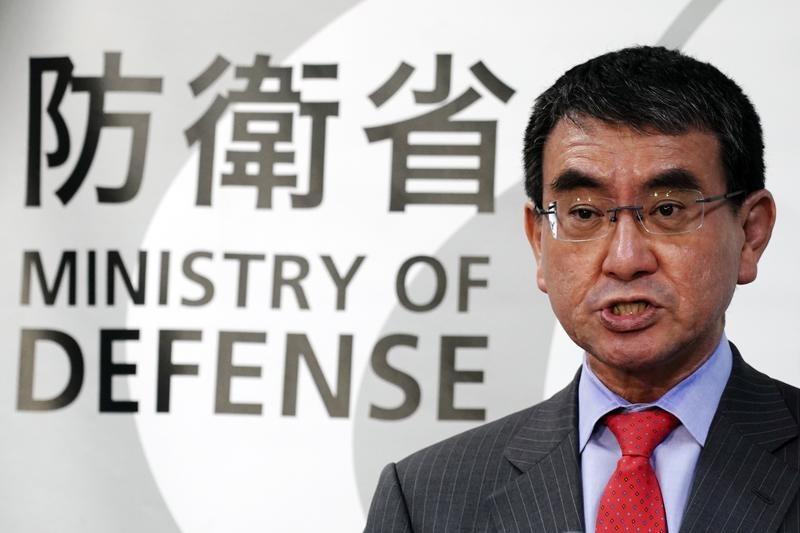 In this Jan 10, 2020, file photo, Japanese Defense Minister Taro Kono speaks during a press conference at his ministry in Tokyo. (EUGENE HOSHIKO / AP)
In this Jan 10, 2020, file photo, Japanese Defense Minister Taro Kono speaks during a press conference at his ministry in Tokyo. (EUGENE HOSHIKO / AP)
Japan on Monday suspended an unpopular plan to deploy a multibillion-dollar missile defense system provided by the United States, with officials citing technical and financial challenges.
The Japanese government decided in 2017 to deploy two Aegis Ashore batteries to bolster the country's current defenses consisting of Aegis-equipped destroyers at sea and Patriot missiles on land
Japanese Defense Minister Taro Kono told reporters at a news conference that he decided to "stop the deployment process" of the Aegis Ashore systems after it was found that a hardware redesign is needed to ensure that rocket debris doesn't endanger residents near the facilities, and that such work would be too time consuming and costly.
"Considering the cost and time it would require, I had no choice but judge that pursuing the plan is not logical," Kono said.
The Japanese government decided in 2017 to deploy two Aegis Ashore batteries to bolster the country's current defenses consisting of Aegis-equipped destroyers at sea and Patriot missiles on land.
ALSO READ: Japan halts deployment of Aegis Ashore missile defence system
The two Aegis Ashore units, to be based in Yamaguchi Prefecture in the south and in Akita Prefecture in the north, were supposed to cover the whole of Japan and be capable of intercepting ballistic missiles. With an advanced radar system and SM-3 interceptor missiles, they were intended to be part of Japan's three-layer missile defense, alongside the Aegis destroyers and the land-based PAC-3 interceptor system.
However, the deployment of Aegis Ashore had faced a series of setbacks from the outset, including questions on site selections and upward revisions on cost estimates last put at 450 billion yen (US$4.1 billion) for their 30-year operation and maintenance. Safety issues for communities in the two prefectures added to the concerns.
'Sensible judgment'
"Meanwhile, there are also concerns in Japan that the deployment was for intercepting long-range missiles targeting the US military in Guam or Hawaii, rather than for Japan's self-defense," said Yu Qiang, a researcher of Japan studies at the University of International Relations in Beijing.
READ MORE: Japan gets its 8th defense budget hike, hits US$48.56b
"In those circumstances, the deployment would interfere with the country's war-renouncing constitution."
Local leaders hailed the suspension of the project, with Akita Governor Norihisa Satake saying the government's judgment was "sensible". Tsugumasa Muraoka, the governor of Yamaguchi Prefecture, said: "I think it's the right decision and it reflects the opinion in the local communities."


